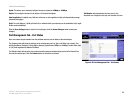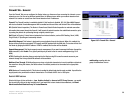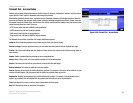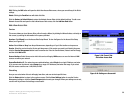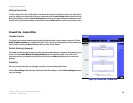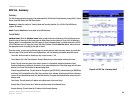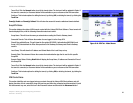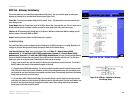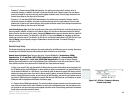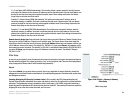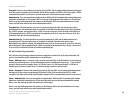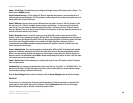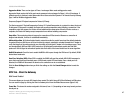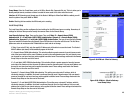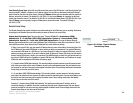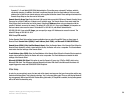
43
Chapter 5: Setting Up and Configuring the Router
VPN Tab - Gateway to Gateway
10/100 8-Port VPN Router
Dynamic IP + Domain Name (FQDN) Authentication: This setting uses a dynamic IP address, which is
constantly changing. In addition, the tunnel is confirmed through use of a domain name. Only one domain
name can be used for one tunnel and may not be applied to another tunnel.These settings must match the
Remote Group Setup on the other end of the tunnel.
Dynamic IP + E-mail Addr.(USER FQDN) Authentication: This setting uses a dynamic IP address, which is
constantly changing. In addition, the tunnel is confirmed through use of an email address. Only one email
address can be used for one tunnel and may not be applied to another tunnel.These settings must match the
Remote Group Setup on the other end of the tunnel.
Local Security Group Type. Select the local LAN user(s) that can use this VPN tunnel. Local Security Group Type
may be a single IP address, a Subnet or an IP address range. The Local Secure Group must match the Remote
Secure Group on the other end of the tunnel. Selecting IP Address allows only one computer, with the specific IP
Address, access to the tunnel. (The default IP is 192.168.1.0.) If you select Subnet, all computers on the local
subnet can access the tunnel. The default IP is 192.168.1.0, and default Subnet Mask is 255.255.255.192. If you
select IP Range, you can specify a range of IP Addresses to access the tunnel. The default IP Range is
192.168.1.0~254.
Remote Group Setup:
The Remote Group Setup section configures the remote settings for the VPN tunnel you are creating. Remember,
all settings for the Remote Group must be exactly the same as those for the Local Group.
Remote Security Gateway Type: There are five types. They are IP Only, IP + Domain Name (FQDN)
Authentication, IP + E-mail Addr. (USER FQDN) Authentication, Dynamic IP + Domain Name (FQDN)
Authentication, Dynamic IP + E-mail Addr. (USER FQDN) Authentication. The type of Remote Security
Gateway Type must match the Local Security Gateway Type of VPN devices in the other end of tunnel. The first
three options are easier to use because the IP Addresses are static and do not change.
IP Only: If you select IP Only, only the specific IP Address that you enter will be able to access the tunnel. It's
the IP Address of the remote VPN Router or device which you wish to communicate. The remote VPN device
can be another VPN Router or a VPN Server. If you know the static IP address of remote VPN device, select IP
address from drop-down menu. If you don't know the static IP address of remote VPN device, but the domain
name of remote VPN device is known, you can select IP by DNS Resolved, and enter the real domain name on
the Internet. RV082 will get the IP address of remote VPN device by DNS Resolved, and IP address of remote
VPN device will be displayed on VPN Status of Summary page.
IP + Domain Name (FQDN) Authentication: This selection affords a greater amount of security because each
side of the tunnel must use the same IP Address as well as the same domain name. Only one domain name
can be used for one tunnel and may not be applied to another tunnel.These settings must match the Remote
Group Setup on the other end of the tunnel.
Figure 5-47: VPN tab - Gateway to Gateway
Remote Group Setup



